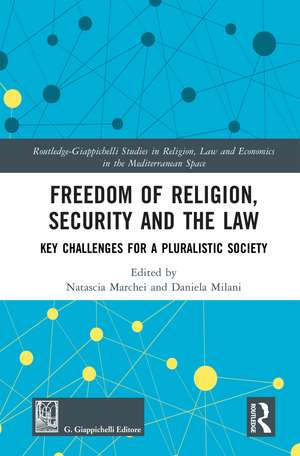Freedom of Religion, Security and the Law: Key Challenges for a Pluralistic Society: Routledge-Giappichelli Studies in Religion, Law and Economics in the Mediterranean Space
Editat de Natascia Marchei, Daniela Milanien Limba Engleză Hardback – 27 mai 2024
Preț: 764.20 lei
Preț vechi: 1027.40 lei
-26% Nou
Puncte Express: 1146
Preț estimativ în valută:
146.23€ • 153.06$ • 121.71£
146.23€ • 153.06$ • 121.71£
Carte tipărită la comandă
Livrare economică 31 martie-14 aprilie
Preluare comenzi: 021 569.72.76
Specificații
ISBN-13: 9781032568898
ISBN-10: 1032568895
Pagini: 240
Dimensiuni: 156 x 234 mm
Greutate: 0.45 kg
Ediția:1
Editura: Taylor & Francis
Colecția Routledge
Seria Routledge-Giappichelli Studies in Religion, Law and Economics in the Mediterranean Space
Locul publicării:Oxford, United Kingdom
ISBN-10: 1032568895
Pagini: 240
Dimensiuni: 156 x 234 mm
Greutate: 0.45 kg
Ediția:1
Editura: Taylor & Francis
Colecția Routledge
Seria Routledge-Giappichelli Studies in Religion, Law and Economics in the Mediterranean Space
Locul publicării:Oxford, United Kingdom
Public țintă
PostgraduateCuprins
Preface, Natascia Marchei and Daniela Milani; Introduction: Freedom of Religion or Belief, and Security: the OSCE/ODIHR Guidelines, Silvio Ferrari; Part I: Freedom of Religion and Security: Case Studies; 1. The right to religious freedom in Israel: A resource or a condemnation? Myriam Lucia Di Marco; 2. Freedom of Religion and Insecurity in Turkey, Sibel İnceoğlu; 3. Defining the Enemy. Egyptian President Al-Sisi and the Restoration of Security, Laure Guirguis; Part II: Freedom of Religion and Security in Italy; 4. Places of Worship, Security and the Public Space in the Case Law of the Italian Constitutional Court, Natascia Marchei; 5. The Specifics of the Concept of Radicalisation: A Meaningful Legal Definition, Alessandro Negri; 6. "The Right to Try to Convince One’s Neighbour": Between the Protection of Freedom and the Fight against Religious Radicalism, Jlia Pasquali Cerioli; 7. Freedom of Religion, Security and Penal Institutions, Daniela Milani; 8. Islam, Security and Immigration in Italy: Administrative Measures, Alessandro Ceserani; Part III: Islam and Integration in Italy: From Religious to Secular Perspectives; 9. Islam: Sources, Principles and Fundamentals, Antonio Cuciniello; 10. Human Rights and Islam, Cristiana Cianitto; 11. Democracy and Islam in the Italian Secular State, Francesco Alicino; 12. Islam as a Religious Faith, or Brief Reflections on the Status of Islam in Italy, Antonio Angelucci; 13. Conclusion: Interaction and Prevention in the Mediterranean Basin. Final Considerations of the Project, Roberto Mazzola; Index
Notă biografică
Natascia Marchei is Full Professor of Law and Religion at the University of Milano-Bicocc, Italy.
Daniela Milani is Full Professor of Canon Law at the University of Milan, Italy.
Daniela Milani is Full Professor of Canon Law at the University of Milan, Italy.
Descriere
This work explores issues arising from managing religious and cultural diversity in a multicultural society and the complex relationship between the right to religious freedom and security. Written by leading experts in the area, it reveals the importance of avoiding simplistic conclusions and unfounded prejudices about religious freedom.


